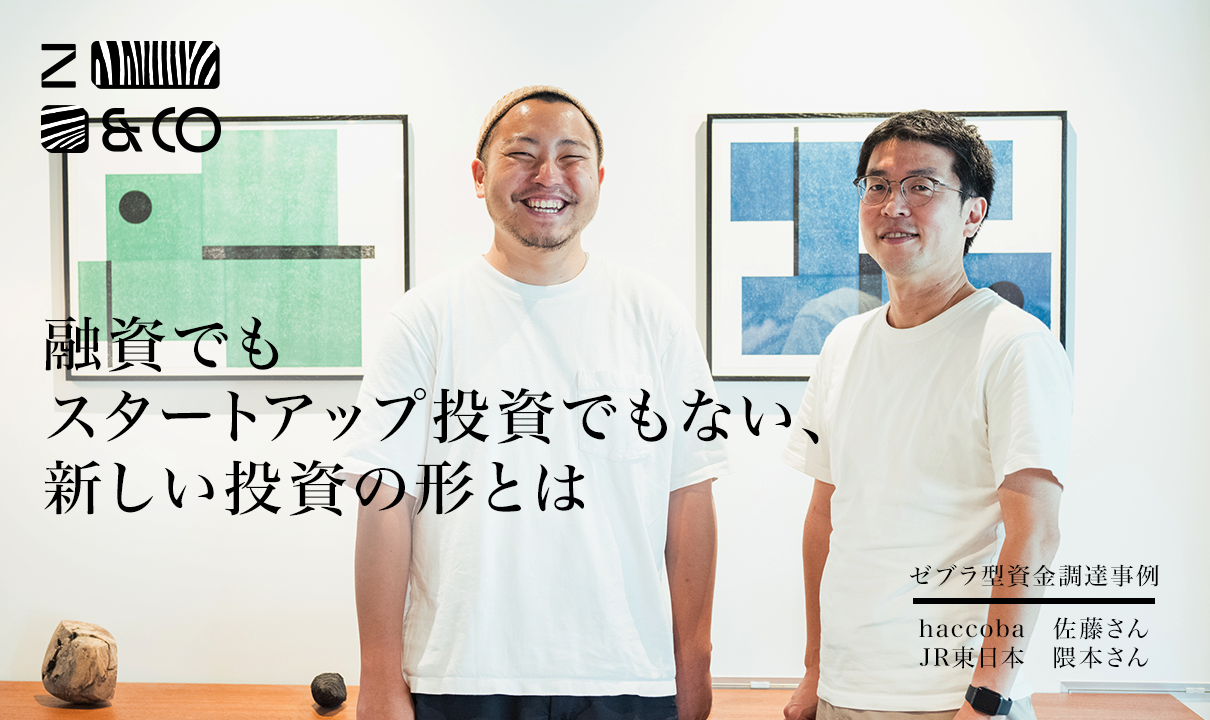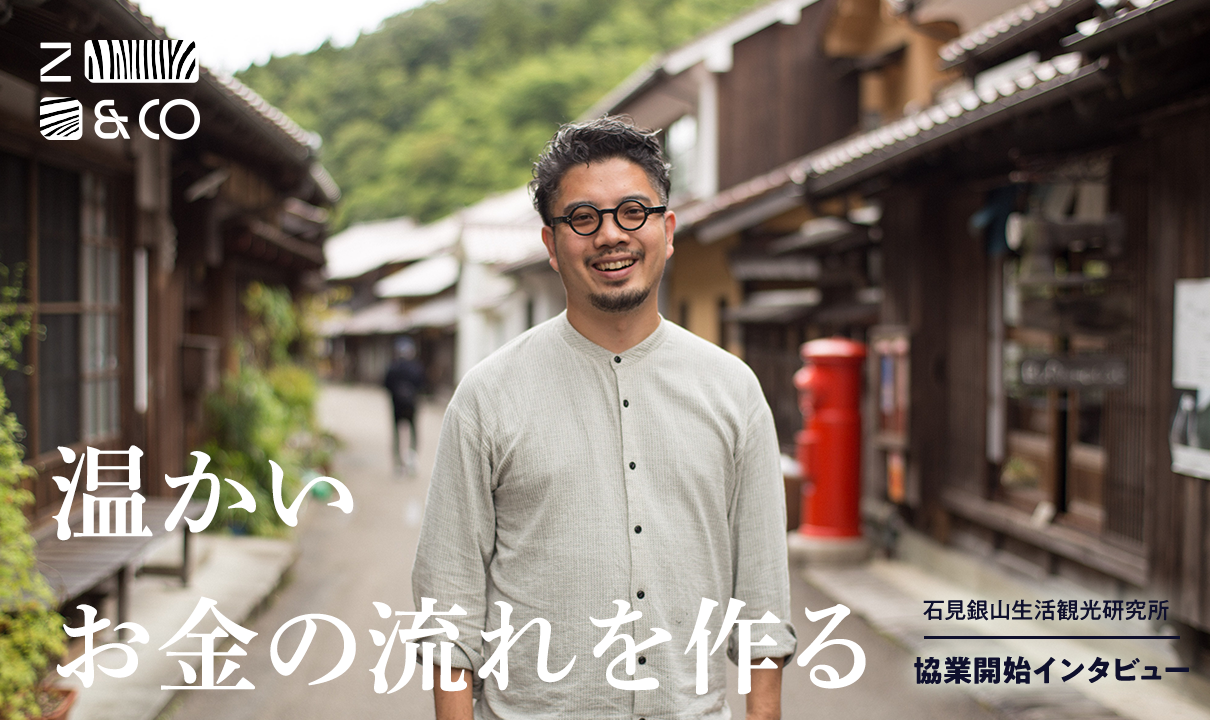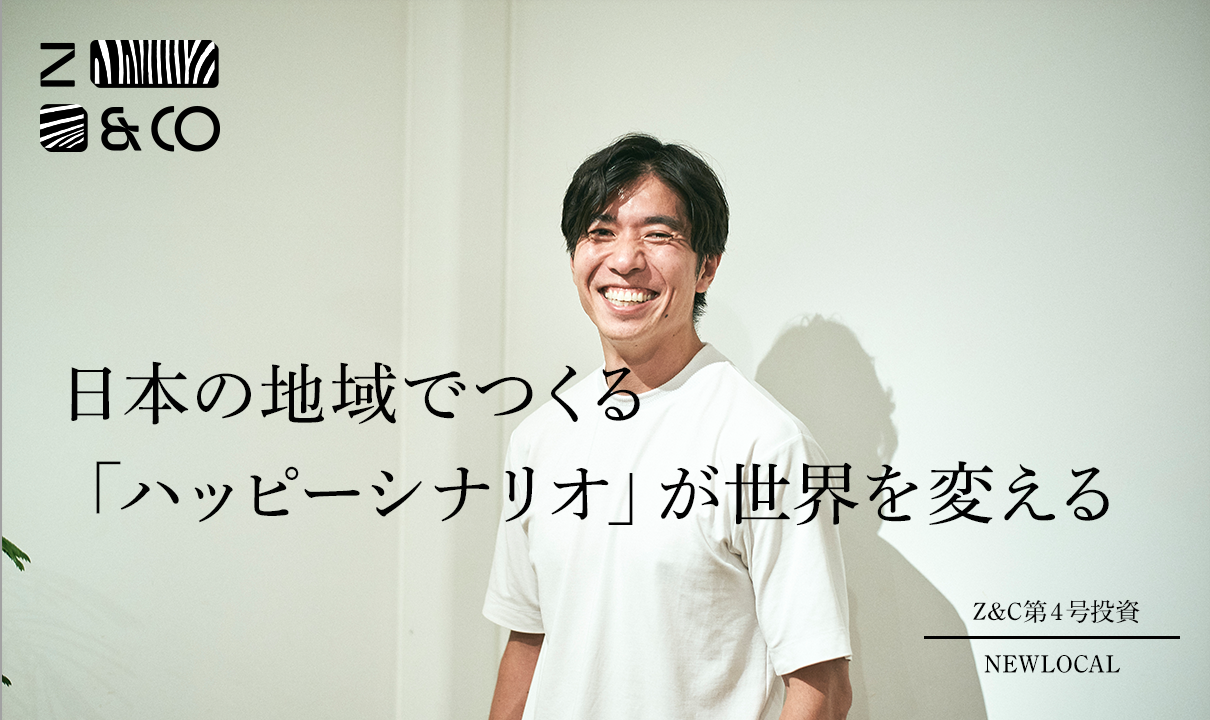
2024.10.09 ZEBRAS
A New Form of Investment: Neither Loans Nor Startup Investments. The Collaboration Between haccoba, Who is Looking 1000 Years Ahead, and JR East Local Startup

In June 2023, JR East Local Startup LLC made a decision to invest in haccoba, a craft sake brewery located in Fukushima Prefecture. This marks the first investment for JR East Local Startup, which Shinkazu Kumamoto, who directed the investment project, describes as “a type of investment that falls between debt and equity.”
Why did JR East Local Startup choose to invest in haccoba? We spoke with Taiki Sato, CEO of haccoba, and Shinkazu Kumamoto of JR East Local Startup about the background and purpose of this collaboration.
A Unique Investment Ensuring Management Freedom
——To begin, please tell us about your respective businesses, starting with Mr. Sato from haccoba.
Sato: haccoba operates a craft sake brewery in Fukushima Prefecture under the philosophy of “Liberating the Process of Sake Brewing.” ” Currently, sake is made only from rice, koji, and water. However, in the recent past, it was made freely through home brewing, which is called doburoku. We aim to revive the culture of craft home-brewed sake from that time, while respecting modern culture.
Experimentative Sake Brewing -namie-
Sato:
Additionally, the Odaka district of Minamisoma City, Fukushima Prefecture, where the sake brewery is located, and the neighboring town of Namie, were towns once depopulated to zero due to the evacuations caused by the nuclear accident of 3/11. We want to revive an autonomous local regional culture by using our brewery and attached pub as a hub for events and gatherings for people of all generations.
——What do you mean by an autonomous local regional culture?
Sato: It refers to a region where life and industry can be sustained with minimal dependence on urban centers. Witnessing the nuclear accident, I felt a sense of irony that the people of Fukushima had to bear the risks of supporting urban life. However, from Fukushima’s perspective, having the nuclear reactor was necessary to stabilize the local economy.
We believe that local and autonomous companies like ours as well as local stakeholders of the region can create a sustainable model for industry and lifestyle. This will allow us to gradually change this system where regions that must rely on urban centers.
——Next, please tell us about JR East Local Startup and your role, Mr. Kumamoto.
Kumamoto: JR East Local Startup LLC was established in April 2023 as a subsidiary of JR East Startup Inc., a corporate venture capital firm promoting investment and collaboration with startups. Unlike startups aiming for rapid growth, we invest in and collaborate with companies rooted in their regions and aiming towards sustainable business models. I was responsible for establishing the subsidiary and handling the investment in haccoba.
——Can you give us an overview of this investment?
Kumamoto:
This investment is made through classified stock with a buy-back clause. A buy-back clause stipulates that if profits exceed a certain level after several years, the company can repurchase the shares at a premium. Classified stock refers to shares that have different features and advantages compared to common stock.
While we retain some veto rights, we do not have voting rights in order to maintain haccoba’s freedom to manage their business. This is essentially an investment that lies between debt and equity.
Sato: The conditions presented this time were made with consideration for the future of haccoba and the region. In the future, haccoba might want to bring in different types of funding, including IPOs and M&As, and there is a possibility of involving other investors. With these possibilities in mind, we adjusted the valuation and conversion ratio accordingly.
When considering the specific conditions, we also referred to the investment scheme “LIFE type1,” which Zebras and Company developed when they invested in “Hitobito Co., Ltd.”
Reference:https://www.zebrasand.co.jp/1254
Kumamoto: Our priority is for haccoba to operate freely and contribute to the region long-term, even if it means not generating significant profits for us.
Balancing Speed and Scale for Cultural Creation
——What was the background that led haccoba to seek funding?
Sato: As we were beginning to consider expanding overseas, we planned to raise funds. We have operated the brewery using loans from local banks and grants since our founding, but we wanted to secure funding to accelerate our growth.
However, we felt that startup-style investment might not fit our needs. Rapid growth-focused funding might distort our decision-making process as a brewery.
Our business is one where value increases over time. Sake brewing is valuable because it is passed down through generations, and community building needs to continue past temporary prosperity. We want to progress by blending traditional and modern values, not making sudden changes. We were exploring funding methods that fit these business characteristics.
——Why didn’t you opt for larger loans?
Sato: We thought loans alone might not suffice for “cultural creation” at the scale we envisioned. To create a culture, diverse stakeholders are beneficial. We aim to become a diverse company in both people and funds, which leads to the option of choosing neither a loan nor a startup investment.
——On the other hand, why did JR East Local Startup choose haccoba as your first investment?
Kumamoto: We saw haccoba as an ideal partner for our mission to support regionally-rooted companies. Also, after a four-year relationship, I trusted Mr. Sato as both a business leader and a person.
Our personal history began four years ago before haccoba was established. We were seated next to each other at a workshop held in Odaka, Fukushima Prefecture.
At that time, Odaka had areas where the Joban Line was not yet fully operational, and parts of the coastal region of Fukushima were still under evacuation orders. While I was still shocked that the disaster was not over, Mr. Sato told me, “I’m planning to move from Tokyo and start a brewery.”
Seeing the potential in this impressive young man, I proposed, “Why don’t we do something together using the unmanned train station building?”
Sato: At that time, I could only respond with interest since we did not even have a brewery yet.
Kumamoto: Yes, but we stayed in touch. During this time, I witnessed haccoba’s management skills in building a brand that sells out immediately and their ability to balance both urban and rural perspectives without leaving anyone behind. They took the time to build trust, and this convinced me that they were reliable.
When the idea of establishing JR East Local Startup came up, I decided to reach out to him again. Since haccoba was also looking to raise funds at that time, this led to the current investment.
Reusing an Unmanned Train Station to Create a Brewery Symbolic of the Local Culture
——Besides funding, I hear there is also a collaboration between the two companies.
Sato: We are planning to open our third brewery using a JR East station building that has become unmanned. As far as we know, this will be the first brewery in the world directly connected to a train platform. It will be a fascinating view being able to see the brewing process right from the station platform.
We aim to create a hub that conveys the exciting atmosphere of a town trying to build a new culture right from the entrance.
haccoba the Second Sake Brewery 、Namie Breweries
Kumamoto: We want to transform the unused station building into a symbolic presence. It is a place that residents use daily for commuting, so it has the potential to become a hub for various visitors.
If this collaboration succeeds and can be packaged, I believe it can be expanded to other station buildings. This would support the creation of industries in each region where a station is located. If such industries can be established in each area, creating jobs and allowing for sustainable growth, it would also restore the value of train stations.
Sato: Many are considering new breweries but are unsure about locations. Collaborating with JR’s 600 unmanned train stations nationwide could have a significant impact.
We have established an industry group called the Craft Sake Brewery Association. In the future, we aim to collaborate with them to create a scheme for launching new breweries, which will serve as a new approach to revitalizing the culture of sake brewing.
——It truly is a collaboration that connects sake brewing with regional culture. When do you plan to open?
Sato: We plan to start construction around October 2023 and aim to open by the end of the year if everything goes smoothly. There is a possibility of delays, but we are working hard to open as soon as possible.
Family, Company, Community: A New Challenge in Cultural Inheritance from This Investment
———Investment and collaboration between large corporations and local startups are expected to increase. What lessons can you share from this initiative for those who are considering similar endeavors?
Sato: As a business receiving investment, it is important not to rush in deciding who to partner with. Conducting business in local areas requires an understanding of the history, culture, and lifestyle, which can only become clear by working in the community. It’s essential to find investors who value these aspects and to carefully consider the type of funding to bring in without rushing.
In that sense, it was beneficial to have considered various options for our capital policy from the beginning. This included considering whether to take out more loans, venture investments, aim for an IPO, or pursue an M&A. We did not need to rush, and it allowed us to encounter new forms of investment like the one we have now.
Kumamoto: I think this investment and collaboration were realized because of the long-standing trust we had built, as well as timing. In fact, I even volunteered to help when Mr. Sato was planning a DIY project at another brewery. The work was challenging, but being working together allowed us to get to know each other even further.
Looking back from an investor’s perspective, I think it is important to make investments that leverage our company’s values and strengths. There are more advanced investors and companies in terms of investment skills and capabilities. However, because we have stations all over the country, we have a unique strength in supporting local communities. It is essential to invest and collaborate in ways that align with our goals and perspectives that make the most of each other’s strengths.
——Finally, what are haccoba’s future prospects?
Sato: We aim to make haccoba a sake brewery that lasts 1000 years. This may sound like a joke, but we make decisions with that scope in mind.
This perspective stems from the difficulty of dealing with “culture.” Both sake brewing and community building carry the potential to distort the traditions and cultures that have been sustained over time. With a sense of becoming the first generation of a brewery that will last 1,000 years, we want to proceed with our business imagining both the past and the future.
Additionally, there is a personal underlying theme in this investment. It is to explore a “new form of family business.” Many companies that have lasted over 100 years are managed as family businesses. However, family businesses often have challenges with governance.
We want to challenge ourselves to create a “new form of family business” that incorporates not only blood-related family members but also external people and funds, while still maintaining continuity. In today’s world, the concept of family and household is constantly being updated. We are seeking answers to questions like what constitutes a family business, how to sustain it, and what new forms of business succession might look like. This investment is the first step in finding my own answers to these questions.

PROFILE
ゼブラ編集部
「ゼブラ経営の体系化」を目指し、国内外、様々なセクターに関する情報を、一緒に考えやすい形に編集し、発信します。






